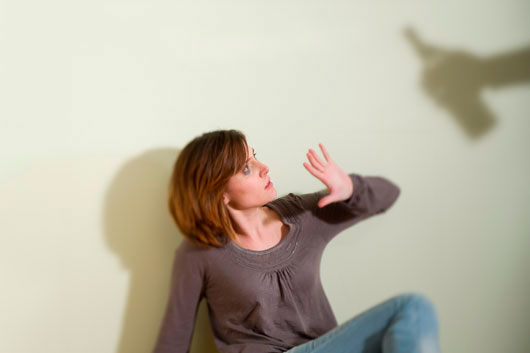
Latinas are widely affected by domestic violence.
He drove me insane. There was just so much I could take. I took revenge.
These are phrases uttered by women who are victims of domestic violence. But tragically, after being beaten and humiliated for so long, these women sometimes resort to violence that often surpasses that of their abusers.
Who can forget the sordid tale of Lorena Bobbitt, the Ecuadorian woman who in 1993, saw no escape from the nightmare she was living in her marriage than to sever the penis of her husband John and toss it into a field? She came to her senses and called 911, his penis was reattached, and she was found not guilty by reason of insanity.
They are now thankfully divorced. Another similar case made headlines on December 5, 2011, when Virginia Valdez, 69, of California, was arrested for taking heavy duty scissors—not the ones for cutting paper hearts—to her husband’s member. According to the Associated Press, he was treated at a local hospital and released. While we don’t know what happened behind closed doors during their 32 years of marriage, what could have caused her to take the violent route she did?
Domestic violence affects far too many Latinas in America. Many see no recourse but to turn within and develop a psychotic break from reality. A woman’s decision to remain in an abusive home may, in part, be related to many Latinas’ lack of economic power. If a woman feels she can make enough money to support herself and her children, she is less likely to be reliant on an abusive male, and more likely to leave a dysfunctional relationship before it gets ugly, according to some experts.Steve Pinker, author of The Better Angels of Our Nature: Why Violence Has Declined, makes an argument that feminism and women participation the workforce over the last decades has decreased domestic violence for both genders. Pinker writes, “[…] cultures that are classified as more individualistic, where people feel they are individuals with the right to pursue their own goals, have relatively less domestic violence against women than the cultures classified as collectivist where people feel they are part of a community whose interests take precedence over their own.”
Latino culture leans on the collectivist side of life, not a more puritan individualistic one, and has its own cultural barriers to overcome: heavy family and societal pressures, religious conservatism, ties to countries with brutal civil wars where machismo runs rampant, and that nasty little complex many Latinas suffer from called marianismo. The term, best described in The Maria Paradox by psychologists Rosa Maria Gil & Carmen Inoa Vazquez , comes from the Virgin Mary and the supposed ideal of true femininity that women are supposed to live up to in Latin culture. Traits like modesty, virtuosity and being subordinate to their husbands and male figures, dutiful to family, thus putting their own lives second.
Fed up Latinas, like Bobbitt and Valdez, may be exploding from all that pent up repression, and tragically claiming that violence for themselves in moments of sheer madness. These days, it’s in our zeitgeist—from bobitazo being baptized as a new Spanish word, to a movie like GirlFight, to the violence being touted in a song like “La Abusadora” by IvyQueen, the female reggaeton singer—reflecting all this Latina frustration gone wrong.
To borrow the tag line of Alianza, National Latino Alliance for the Elimination of Domestic Violence, “We have many beautiful traditions; family violence is not one of them.” Latinas do not have to live in fear or be driven to the brink.
Help Stop Domestic Violence
If you or someone you know is dealing with domestic violence, please call 1-800-799-SAFE (7233) as soon as possible, for help and guidance. Here are other valuable resources that could help save a life.
- Alianza: National Latino Alliance for the Elimination of Domestic Violence
- U.S. National Domestic Violence Hotline at 1-800-799-7233 and TTY 1-800-787-3224
- HelpGuide.org, Domestic Violence
General Warning Signs of Domestic Abuse
While it’s impossible to tell what happens in the privacy of people’s homes, there are some telltale signs and symptoms of emotional abuse and domestic violence. If you witness any warning signs of abuse in a friend, family member, or co-worker, take them very seriously.
People who are being abused may:
• Seem afraid or anxious to please their partner.
• Go along with everything their partner says and does.
• Check in often with their partner to report where they are and what they’re doing.
• Receive frequent, harassing phone calls from their partner.
• Talk about their partner’s temper, jealousy, or possessiveness.
Warning Signs of Physical Violence
People who are being physically abused may:
• Have frequent injuries, with the excuse of “accidents.”
• Frequently miss work, school, or social occasions, without explanation.
• Dress in clothing designed to hide bruises or scars (e.g. wearing long sleeves in the summer or sunglasses indoors).
Warning Signs of Isolation
People who are being isolated by their abuser may:
• Be restricted from seeing family and friends.
• Rarely go out in public without their partner.
• Have limited access to money, credit cards, or the car.
Psychological Warning Signs of Abuse
People who are being abused may:
• Have very low self-esteem, even if they used to be confident.
• Show major personality changes (e.g. an outgoing person becomes withdrawn).
• Be depressed, anxious, or suicidal.
Source: HelpGuide.org, Melinda Smith, M.A., and Jeanne Segal, Ph.D.












Leave a Reply
Want to join the discussion?Feel free to contribute!